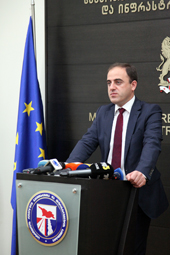
New Initiative of Ministry of Regional Development and Infrastructure of Georgia
By Tatia Megeneishvili
Tuesday, August 27
The Ministry of Regional Development and Infrastructure of Georgia (MRDI) came out with 3 new initiatives. The statement concerning the issue was made by the Minister of Infrastructure, Davit Narmania, on August 26. The initiatives concern preventive measures against natural disasters and tourism development.
Narmania stressed that these are three the most “touchy” issues that require assistance in the frame of the ministry.
“The first one is the prevention of natural disasters, the second is tourism development and the third is the improvement of water supplies in villages,” the minister emphasized.
Narmania stated that their activities and regional monitoring displayed damaged drainage channels in city-type settlements as the major problem causing floods and landslides.
The minister informed that the state budget spends millions of GEL in compensation for the damage caused by natural disasters; accordingly, the priority must be the prevention of such events.
"We call on local municipalities to take the work into account for the next year, and they should present proposals for strengthening the drainage canals and landslide areas in order to carry out the required work in a timely manner," said Narmania.
According to the minister, public infrastructure, tourist and cultural areas are looked after by the ministry this year. However, each municipality should allocate resources for the most important tourist/cultural areas for gaining better outcomes in this regard. The minister stressed those directions that should be fitted into the municipality's future plans: water supply, access to roads, parking and toilets for tourists is some of the most pressing problems.
"The monitoring showed that the main concerns for rural areas are water supply problems," said Narmania. According to the minister, the ministry is preparing a legislative proposal that will result in the filling of the vacuum, which was created after the changes were accepted in 2007.
“Village water should be the property of the municipalities. It will be a big step toward decentralization. The burden should not be placed in the municipalities,” stressed Narmania.
Written requests will be sent to the respective municipalities in the coming days. The work for undertaking the projects will be financed from the Fund of Regional Projects.

